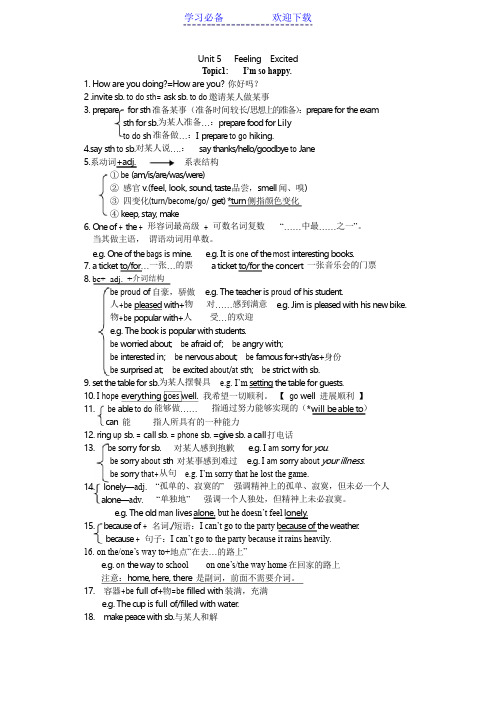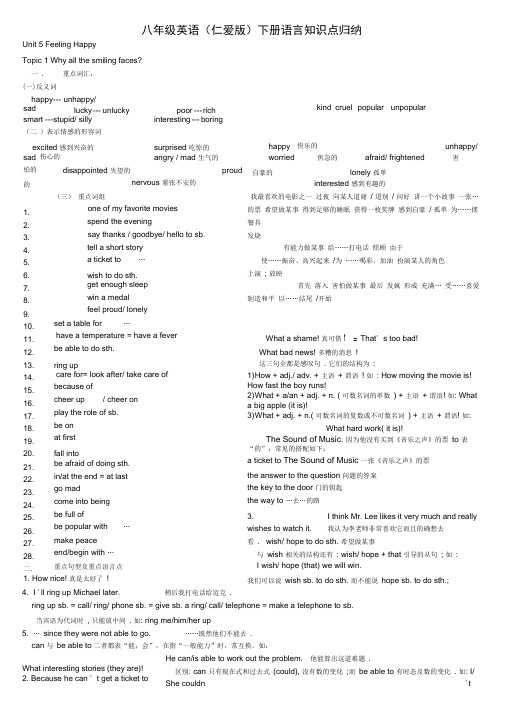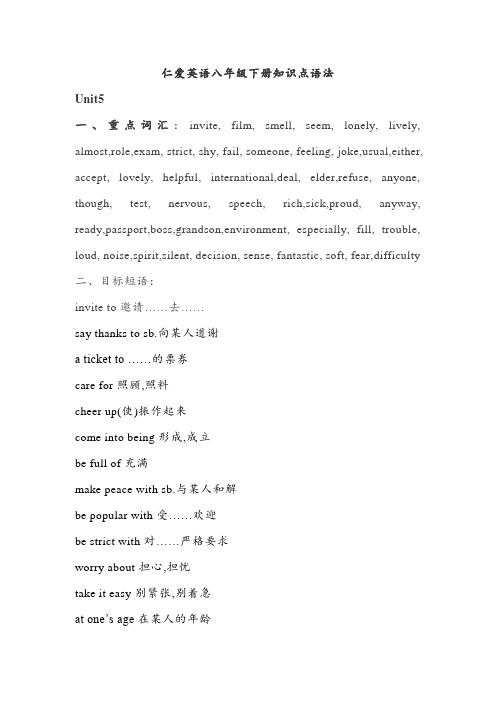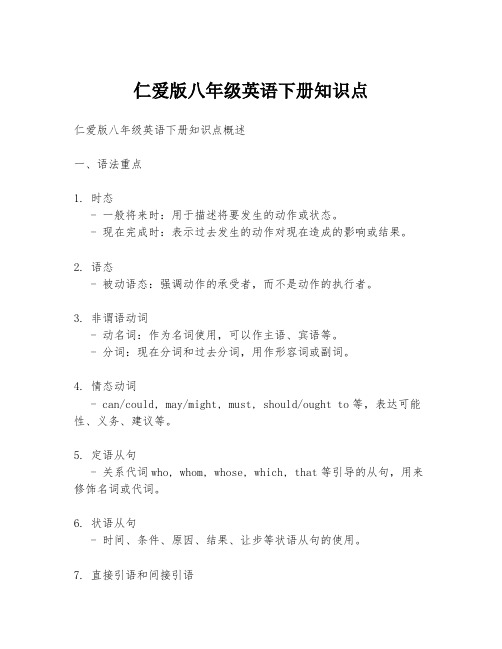2013春仁爱英语八年级下册语法知识点
- 格式:doc
- 大小:73.00 KB
- 文档页数:10

Unit5Feeling ExcitedTopic1:I’m so happy.1.How are you doing?=How are you?你好吗?2.invite sb.to do sth=ask sb.to do邀请某人做某事3.prep are for sth准备某事(准备时间较长/思想上的准备):pr epare for the examsth for sb.为某人准备…:prepare food for Lilyto do sh准备做…:I prepare to go hiking.4.say sth to sb.对某人说….:say thanks/hello/goodbye to Jane5.系动词+adj.系表结构①be(am/is/are/was/were)②感官v.(feel,look,sound,taste品尝,smell闻、嗅)③四变化(turn/become/go/get)*turn侧指颜色变化④keep,stay,mak e6.O ne of+the+形容词最高级+可数名词复数“……中最……之一”。
当其做主语,谓语动词用单数。
e.g.On e of the bags is mine. e.g.It is one of the most interesting books.7.a ticket to/for…一张…的票a ticket to/for the concert一张音乐会的门票8.be+adj.+介词结构be proud of自豪,骄傲 e.g.The teacher is proud of his student.人+be pleased with+物对……感到满意 e.g.Jim is pleased with his new bike.物+be popular with+人受…的欢迎e.g.The b ook is popular with students.be worried about;be afraid of;be angry with;be interested in;be nervous about;be famous for+sth/as+身份be surprised at;be excited about/at sth;be strict with sb.9.set the table for sb.为某人摆餐具 e.g.I’m setting the table for guests.10.I hope everything goes well.我希望一切顺利。

E n g l i s h 语法归纳(初二下)BY {cy2.}Unit 5 Topic 1 Section A 系动词+adj. 构成系表结构。
Invite sb. /to do sth. 邀请某人做某事。
邀请某人做某事。
邀请某人做某事。
Invite sb. \+地点地点 邀请某人去某地。
邀请某人去某地。
Prepare Prepare……for for……=get ready for … 为……准备。
为……准备。
Say thanks to sb. 向某人道谢。
向某人道谢。
Section B A ticket to\for ………的票。
……的票。
Be able to do sth … 有能力做某事。
有能力做某事。
=can 。
但是can 一般用于现在时和过去时 而be able to 可以用于任何时态。
Ring sb. up 打电话给某人。
打电话给某人。
打电话给某人。
Be proud of 以……骄傲。
以……骄傲。
以……骄傲。
Be pleased with … 对……满意。
对……满意。
Section C Care about 关心关心Care+从句省略about Get married to sb.= marry sb. 与某人结婚。
与某人结婚。
关于花费:Sth. Cost sb.+钱Sb. spend+时\钱 in 、on sth.\doing sth. It take sb\时 to do sth. Sb.pay 钱 for sth. Be on 上映。
上映。
Cheer up 使……振作。
使……振作。
What What……for=why 。
(口语)(口语)To+动词不定式。
同级比较特殊疑问词+不定式。
(what to do\how to do it)原因状语从句。
引导原因状语从句的常用连词是what。
用于回答why引导的问句。
结果状语从句So…that…引导的结果状语从句。
So+adj.+从句。

八年级英语(仁爱版)下册语言知识点归纳kind cruel popular unpopular我最喜欢的电影之一 过夜 向某人道谢 / 道别 / 问好 讲一个小故事 一张…的票 希望做某事 得到足够的睡眠 获得一枚奖牌 感到自豪 / 孤单 为……摆餐具 发烧有能力做某事 给……打电话 照顾 由于使……振奋、高兴起来 /为 ……喝彩、加油 扮演某人的角色 上演 ; 放映首先 落入 害怕做某事 最后 发疯 形成 充满… 受……喜爱制造和平 以……结尾 /开始What a shame! 真可惜! = That ' s too bad! What bad news! 多糟的消息 !这三句全都是感叹句 . 它们的结构为 :1) H ow + adj./ adv. + 主语 + 谓语 ! 如 : How moving the movie is! How fast the boy runs! 2) W hat + a/an + adj. + n. ( 可数名词的单数 ) + 主语 + 谓语! 如: What a big apple (it is)! 3) W hat + adj. + n.( 可数名词的复数或不可数名词 ) + 主语 + 谓语! 如:What hard work( it is)!The Sound of Music. 因为他没有买到《音乐之声》的票 to 表“的”,常见的搭配如下:a ticket to The Sound of Music 一张《音乐之声》的票 the answer to the question 问题的答案 the key to the door 门的钥匙 the way to …去…的路 3.I think Mr. Lee likes it very much and reallywishes to watch it.我认为李老师非常喜欢它而且的确想去看 . wish/ hope to do sth. 希望做某事与 wish 相关的结构还有 : wish/ hope + that 引导的从句 ; 如 :I wish/ hope (that) we will win.我们可以说 wish sb. to do sth. 而不能说 hope sb. to do sth.;4. I 'll ring up Michael later.稍后我打电话给迈克 .ring up sb. = call/ ring/ phone sb. = give sb. a ring/ call/ telephone = make a telephone to sb.当宾语为代词时 , 只能放中间 . 如: ring me/him/her up5. … since they were not able to go. ……既然他们不能去 .can 与 be able to 二者都表“能;会”,在指“一般能力”时,常互换。

仁爱英语八年级下册知识点语法Unit5一、重点词汇:invite, film, smell, seem, lonely, lively, almost,role,exam, strict, shy, fail, someone, feeling, joke,usual,either, accept, lovely, helpful, international,deal, elder,refuse, anyone, though, test, nervous, speech, rich,sick,proud, anyway, ready,passport,boss,grandson,environment, especially, fill, trouble, loud, noise,spirit,silent, decision, sense, fantastic, soft, fear,difficulty 二、目标短语:invite to 邀请……去……say thanks to sb.向某人道谢a ticket to ……的票券care for 照顾,照料cheer up(使)振作起来come into being 形成,成立be full of 充满make peace with sb.与某人和解be popular with 受……欢迎be strict with 对……严格要求worry about 担心,担忧take it easy 别紧张,别着急at one’s age在某人的年龄tell jokes 讲笑话with the help of 在……帮助下be/ get used to (doing)sth.习惯于(做)某事all the time 总是,一直deal with 处理,解决even though 即使,尽管no longer/ not any longer 不再give a speech 发表演讲be in a bad mood 情绪不好be proud of 以……自豪give sb. a surprise 给某人一个惊喜get ready for 为……做准备fill with(使)装满,充满be crowded with 挤满think over 仔细考虑make a decision做决定三、重点句型1.—How are you doing?—Very well, thank you.2. You look excited.3.—He felt disappointed because he was not able tobuy a ticket to The Sound of Music.—What a pity!4. He seems a little unhappy.5. It’s so funny and interesting.6. We felt excited to hear it.7.In China it used to be popular with old people while young people didn’t like it very much.8. What seems to be the problem?9.She feels very lonely because she has no friends to talk with.10. Why don’tyou talk to someone when you feel sad?11. Everyone gets these feelings at your age.12. How time flies!13. What’s more, I couldn’t sleep as well as usual.14. The food was not as delicious as ours,either.15. Please give my best wishes to your parents.16. Is there anything wrong?17. You see a snake lying on the road.18.Think it over before making an important decision.四、功能意念句型1.高兴I’m so happy!That’s lovely/ great/ very exciting/ wonderful! How wonderful/ nice!It’s well done. I’mpleased to know that.2.惊奇Really?Oh dear!Is that so?What a surprise!How nice to see you!How surprising!I’m surprised!Does thatWha t’s wrong?What’sthe matter?Anything wrong?What should we do?Are you worried about your health?I’m worried.4.安慰There, there.Don’t be afraid.Don’ t worry.It’s(quite) all right.It’ll be OK/ all right.Take it easy.5.满意Wow! Sounds great!Good!Well done!It’s so exciting.Perfect!That’s fine.That’s better.That’s good enough.I’m pleased with your spoken English.6.遗憾What a pity!I’m so sorry!It’s a great pity!What a shame!That’s too bad.7.同情I’m so sorry!I’m sorry to hear that.I’m so sorr y about your illness.I’m sorry to hear you are going away.Please accept my deep sympathy.8.恐惧Help!How terrible!I’m afraid of that dog.I’m frightened.I’m afraid of taking bitter medicine.五、语法项目1.系动词+形容词结构。2.由because引导的原因状语从句。3.形容词的同级比较(as... as... , not as/ so... as...)。4.简单句的六种基本句型。Unit6一、重点词汇:field, proper, price, total, pay, hotel, fridge,standard, single, condition, comfortable, raise,king,queen, common, Canadian, dollar, somebody, top,receive, postcard, vacation, camp, north, east,west,wait, bicycle, tour, space, push, direction, step,beside, experience, everywhere, passenger, crazy,anywhere, pollution, advantage, careless, safety,truck, notice, empty, Asia, among, France, mile,central, winner explain, Europe, French, town,village, slow, opposite, rush二、目标短语spring field trip 春游find out 发现,查明decide on sth.对某事做出决定air conditioner 空调a standard room with one single bed 单人标准间raise money 筹钱look forward to(doing) sth.期望(做)某事hear from 收到……来信prepare for 准备on vacation 度假work out 算出,制定,完成in all directions 向四面八方push out 推开,挤出as soon as 一……就……be famous for 以……著名can’t help doing禁不住做be/ get used to 习惯于……agree/ disagree with sb.同意(不同意)某人的观点pay attention to 注意in case of 如果,假使look out 小心三、重点句型:1.Boys and girls, I have some exciting news to tell you!2.We’re going on a three⁃day visit to Mount Tai.3. What do you think your trip will be like?4.It is very common to raise money in Canadian and American schools.5.I’m looking forward to hearing from you.6. The best way to raise money is to sell newspapers.7.Why don’t we put on a show to raise money?8.While you were enjoying your trip, I was busy preparing for my exams.9. It’s about one and a half hours by bike.10.He was too worried to think about what to do.11.He didn’t raise his head until someo ne called him.12.While we were having fun exploring, I found that Darren was lost.13.When I first arrived,I was afraid of riding my bike anywhere.14. If we break the traffic rules, we may get a fine and even be in danger.15.In case of an accident, bicycle riders should know how to give first aid.六、功能意念句型提醒注意Don’t forget your raincoat.Remember to lock the door.Mind your head/ step!No smoking!No spitting!Wet floor!Look out!Be careful!It’s dangerous!Don’t touch!Don’t push!No photos here!五、语法项目.动词不定式作定语、表语、宾语、宾语补足语、目的状语和主语等。2.由while,after, before, as, when, until 和as soon as 引导的时间状语从句。3. if 引导的条件状语从句。Unit7一、核心词汇task, touch, success, imagine, soup, cookie, pancake,set, blind, western, Indian, African, Russian, address,regret, group, member, purpose, oil, add, noodle, bowl,quick, pear, piece, polite, fork, dish, spoon, chopstick,finger, southern, pick, lady, gentleman, sale, guest,menu, bill, corn, salad, lemon, bean, carrot, seat, job,worth, education, develop二、目标短语turn to sb.向某人求助get in touch with(与……)取得联系try one's best 尽最大努力set the table 摆放餐具have a sweet tooth 爱吃甜食fight against 反抗,和……打架as a result 结果make a change 改变in order to 为了come true 变为现实,成为事实cut up 切碎,剁碎table manners 餐桌礼仪drink to sb. / sth.为某人/ 某事干杯(或祝酒)far away from 远离pick up 捡起,获得,收拾for sale 待售pay the bill 结账have a seat 请坐in short 总之;简而言之not only…but also …不仅……而且……三、重点句型1.My task is to make a poster.2. I will think about how to hold the food festival.3. Let's try our best to make it a success.4. That's good enough.5. Thank you for inviting me to your food festival.6. I regret that I cannot come.7. But I'm not sure whether I can cook it well.8.—Would you like me to help you?—Yes, please.It's very kind of you.9.Could you tell us how to make it?10.—Would you mind if we learn to make itfrom you?—Of course not.11. Practice makes perfect.12. Help yourself to some soup.13. Remember not to drink too much.14.If you can't remember these rules, just do as other people do.15.—Do you know whether or not it's impolite to smoke during a meal in France?—Yes, I do.It's impolite.四、功能意念句型1.就餐(1)—Would you like something to eat/ drink?—Yes, I'd like some meat/ a cup of tea/ ...(2)—What would you like (to have)?—Rice and chicken, please.(3)—May I take your order?—Certainly. I'd like ...(4)—May I have the bill,please?—Let me see. It's ¥50.—Here you are.—Here's your change. Thanks for coming.(5)—How much would you like?—Just a little, please.(6)—What would you like for breakfast?—Eggs and milk.(7)—Would you like some more fish?—No, thanks. I'd had enough. / I'm full.(8)—Help yourselves to some soup.—Thank you. It's delicious. (9)—May I have the menu, please?—OK. Here it is.(10)—Here is a table for two. Is it OK?—Sure. We'll take it.2.建议Let's go and have a look.What/ How about a picnic this Sunday?Why don't you buy a computer?Why not go to a movie?You'd better take a camera.You shouldn't miss Xishuangbanna.3.顺序What did you do next?Finally we found the lost boy.It rained even harder later on.First, Second, Third, Fourth, FinallyFirst… Second … Next … Then … After that …Finally …五、语法项目1.that,if/ whether 引导的宾语从句。2.副词的比较级和最高级。Unit8一、核心词汇smooth, silk, handbag, afford, tie, sweater, scarf, blouse, sock, pocket, size, pretty, handsome, succeed, customer, simple, business, discuss, meaning, depend, survey, interview, enter, knee, text, reason, heat, airport, officer, patient, spread, daily, northern, similar, traditional, Asian, personal, express, above, list, choice, mix二、目标短语so … that如此……以至于…… prepare for准备be made of 由……制成protect…from…保护……不受……的侵害easy⁃going 随和的depend on 取决于;依靠agree with sb.同意某人的观点plain clothes 便衣carry out 开展,执行special task 特殊任务stop sb.from doing sth.阻止某人做某事on every occasion 在每个场合take off 脱下,摘掉in one's opinion 在某人看来as well as 除……之外;也还model the clothes 展示时装minority costume 少数民族服装stand for 代表become known to 为……所知,闻名于……from then on 从那时起be different from 与……不同either … or …或者……或者……well⁃known 著名的,众所周知的at one time 曾经三、重点句型1.What a nice coat!2.I liked it so much that my father bought it for me.3.—Shall we meet at the school gate at 8 ∶00 a.m.? —All right.4.—Excuse me, could you tell me where to buy a scarf? —Sure. You can go to the Women's Wear Section on the third floor.5.—What size do you take? —Size M.6.It's such a cool windbreaker that you should buy itat once.7. It's important for you to help people choose suitable clothing.8. But nowadays, clothes do more than just keep us warm.9. She says that our school plans to make uniforms for us.10. It depends on who will design our uniforms.11. She asks what materials they should choose.12.—Could you tell me where the special shoes are? —This way, please.13.It is suitable for us to wear business suits in a meeting.14. Here come the models!15.The Tang costume stands for Chinese history and fashion culture.四、功能意念句型1. 购物—Can/ May I help you? / What can I do for you?—I'd like a scarf. —What would you like to buy?—I'd like these cotton pants. —Would you like to try on another pair?—What about the blue one? It's made of natural materials.—What color would you like?—I'd like red. —Perfect!—How many/ much would you like?—Two and a half kilos, please.—May I try it/ them on?—Sure. / OK. / Certainly. That's fine. I'll take it/ them. Well, I'll think about it/ them. Sorry, it's too expensive. Just have a look. 2. 特征(1)形状—What's the shape of your present?—It's round/ long/ tall/ short. It's a circle/ square. It's a U⁃shaped road.—What does it look like? —It looks like a camel.(2)价钱—How much is it/ are they?—It's/ They're 80 yuan / dollars. Is it cheap/—What size of shoes do you wear?—Size S/ M/ L. It's too big/ small/ long/ short for me. (4)材料—What is it made of/ from?—It's made of/ from wood.五、语法项目1.so tha t, so … that, such… that …引导的状语从句。2. It is+adj.+that 从句和It is+adj. +(for sb.) to do sth. 句型。3.由连接代词和连接副词引导的宾语从句。。

仁爱版八年级英语下册知识点仁爱版八年级英语下册知识点概述一、语法重点1. 时态- 一般将来时:用于描述将要发生的动作或状态。
- 现在完成时:表示过去发生的动作对现在造成的影响或结果。
2. 语态- 被动语态:强调动作的承受者,而不是动作的执行者。
3. 非谓语动词- 动名词:作为名词使用,可以作主语、宾语等。
- 分词:现在分词和过去分词,用作形容词或副词。
4. 情态动词- can/could, may/might, must, should/ought to等,表达可能性、义务、建议等。
5. 定语从句- 关系代词who, whom, whose, which, that等引导的从句,用来修饰名词或代词。
6. 状语从句- 时间、条件、原因、结果、让步等状语从句的使用。
7. 直接引语和间接引语- 引述别人的话,注意时态、人称和指示代词的变化。
二、词汇与短语1. 常用词汇- 描述人物特征的形容词,如kind, honest, creative等。
- 描述日常活动的动词短语,如clean up, take out, give up等。
- 与学校生活相关的名词,如classroom, library, project等。
2. 短语动词- look after, turn off, get along with等。
3. 常见搭配- 形容词与名词的搭配,如good habits, heavy rain等。
- 动词与副词的搭配,如finish quickly, study hard等。
三、阅读理解1. 抓住文章主旨- 通过阅读标题、首段和结尾段,快速把握文章大意。
2. 推理判断- 根据上下文线索,推断生词或隐含信息的含义。
3. 细节理解- 通过关键词定位,准确获取文章中的具体信息。
四、写作技巧1. 句型多样性- 使用复合句、并列句等多样化的句型,丰富文章结构。
2. 逻辑连贯- 使用连接词,如however, therefore, moreover等,使文章结构清晰、逻辑性强。

仁爱英语八年级下全册语法精讲连系动词的种类及其基本用法一、连系动词的种类。
连系动词也叫系动词,是表示主语“是什么”或“怎么样”的词。
它本身有词义,但不能单独作谓语,后面必须跟表语,构成系表结构来说明主语的状况、性质、特征等。
主要有:be, become, get,turn,grow, look, feel, seem, sound, taste, smell, appear等。
常见的连系动词可分为五种。
1. 状态系动词:只有be一词。
I am used to going about alone.我习惯于独来独往。
2. 持续系动词:表示主语继续或保持一种状况或态度,主要有keep,remain,stay, rest, lie, stand。
I hope you’ll stay healthy.我希望你身体好。
He always kept silent at meeting.他开会时总保持沉默。
The door remained closed. 门仍然关着。
3.表像系动词:表示“看起来好像”,主要有seem, appear, look等。
He looks tired. 他看起来很累。
He seems (to be) quite happy.他好像很快活。
He appeared quite well.他显得身体相当好。
4. 感官系动词:表示“……起来”,有feel (摸起来,感觉) , smell (闻起来) ,sound (听起来) , taste (尝起来,吃起来) 等。
This kind of cloth feels very soft. 这种布摸起来很软。
They looked very tired. 他们看起来很累。
It sounds a good idea.这听起来是个好主意。
This food tastes good.这食物尝起来不错。
5.变化系动词:表示主语变成什么样,即表示从一种状态变为另一种状态。
仁爱版八年级下册英语知识点仁爱版八年级下册英语知识点概述一、时态与语态1. 一般将来时:用于描述将要发生的动作或状态。
- 构成:will + 动词原形- 例句:We will go on a school trip next week.2. 现在进行时的被动语态:表示正在进行的动作被他人执行。
- 构成:am/is/are + being + 过去分词- 例句:A new road is being built near our school.3. 过去完成时:表示在过去某一时间点之前已经完成的动作。
- 构成:had + 过去分词- 例句:They had finished their homework before the movie started.二、非谓语动词1. 动名词:作为名词使用,表示动作。
- 例句:Swimming is my favorite sport.2. 分词(现在分词与过去分词):- 现在分词:表示正在进行的动作。
- 例句:The children are playing in the park.- 过去分词:表示被动或完成的动作。
- 例句:The window broken by the ball needs to be repaired.三、情态动词1. can/could:表示能力或许可。
- 例句:Can you help me with my homework?- 礼貌请求:Could you please close the door?2. may/might:表示可能性或许可。
- 例句:You may use my computer if you need to.3. must/should:表示建议或义务。
- 例句:You should wear a helmet when riding a bike.- 强调义务:We must obey the traffic rules.四、句型结构1. 条件句:用于表达在特定条件下的结果。
Topic 3 一.词汇:talk about 谈论…last month 上个月Xidan Shopping Center西单购物中心charming models 迷人的模特beautiful clothes 漂亮的衣服amazing show 惊人的表演a common dress 一条普通的裙in the world of… 在…领域high fashion 高级时装a minority costume少数民族服装the model in the center of the catwalk T形台中央的模特the others (三个以上之中的)其余人或物= the other + 复数名词as for… 至于full of … 充满…stand for … 代表…Chinese history 中国历史fashion culture 时装文化from then on 从那时起personal style 个人风格design… as … 按…设计…western-style suits 西服heavy cotton jeans厚厚的棉质牛仔裤at one time = once 曾经become / be known to …为…所熟知become / be known(famous)for…因…而出名become/be know(famous) as 作为…而出名二. 重点句型:1.There’s going to be another one there tomorrow.明天在那将举行另一场时装秀。
There is going to be…是There be结构的将来时,表示某地将举行某项运动,或将有某物。
如:There is going to be a football match in our school next week.=There will be a football match in our school next week.我们学校下周将有一场足球比赛。
八年级语法归纳Unit5Topic1SectionA系动词+adj. 构成系表结构。
Invitesb./todosth.邀请某人做某事。
Invitesb.\+地点邀请某人去某地。
Prepare for =getreadyfor 为准备。
Saythankstosb.向某人道谢。
SectionBAticketto\for 的票。
Beabletodosth 有能力做某事。
=can。
但是can一般用于现在时和过去时而beableto可以用于任何时态。
Ringsb.up打给某人。
Beproudof 以骄傲。
Bepleasedwith 对满意。
SectionCCareabout关心Care+从句省略aboutGetmarriedtosb.=marrysb. 与某人结婚。
关于花费:Sth.Costsb.+钱Sb.spend+时钱in、onsth.\doingsth.时todosth.钱forsth.Beon上映。
Cheerup使振作。
What for=why。
〔口语〕SectionDComeintobeing 形成。
Befullof=befilledwith 充满。
Endwith 以结尾。
Makepeacewithsb.与某人讲和。
Unit5Topic2To+动词不定式。
SectionASeem/todosth.似乎做某事。
\adj作表语。
Itseemthat+从句。
Havetalkwithsb.与某人交谈。
Bestrictwithsb. 对某人严格。
SectionBFailtodosth.失败,做不到某事。
Atone’sage.在年龄时Attheageof.在岁时Makesb.todosth让某人做某事。
同级比较As+adj\adv原级+as与一样。
Notas\so+adj\adv原级+as与不一样。
Be\getusedtodoingsth.习惯做某事。
Usedtodosth.过去习惯做某事。
SectionCBeafraidofdoingsth. 害怕做某事。
(完整版)仁爱版英语八年级下册知识点梳理Unit 5 Topic 1You look excited【重点词组】1. invite sb. to do sth.邀请某人做某事2.one of +形容词最高级+ 名词复数3. say thanks/hello/sorry/good-bye to sb. 向某人致谢/问好/道歉/告别4. feel/taste/smell/look/sound/seem +adj.5. seem to do sth.seem+adj.it seems that+从句6. a ticket for/to sth.一张……的票7. lonely adj.孤独的alone adj./adv.独自的,一个人的8. because of+n./pron/v-ing 因为,由于9. cheer sb. up使某人振作起来10. care for =take care of = look after照顾11. come into being 形成,产生12. be full of = be filled with充满……13. agree with sb.同意某人14. make peace with sb.与某人和平相处15. in the end =at last = finally最后,最终16. be popular with sb.受某人欢迎【词形变化】1.invite v.邀请invitation n.邀请2.disappionted adj.失望的,沮丧的disappointment n.失望,沮丧disappoint v.使失望3.excite v.使激动,使兴奋excited adj.兴奋的,激动的(修饰人)exciting adj.令人兴奋的,使人激动的(修饰物)4.main adj.主要的mainly adv.主要地5.face n.脸,面部facial adj.面部的6.worry v.担心worried adj.担心的,担忧的【重点句型】1.--How are you doing?你好吗?--Very well.非常好。
Unit 5Feeling ExcitedTopic1: I’m so happy.1. How are you doing?=How are you? 你好吗?2 .invite sb. to do sth= ask sb. to do邀请某人做某事3. prepare for sth准备某事(准备时间较长/思想上的准备):prepare for the examsth for sb.为某人准备…:prepare food for Lily准备做…:I prepare to go hiking.4.say sth to sb.对某人说….:say thanks/hello/goodbye to Jane5.系动词+adj.系表结构① be (am/is/are/was/were)②感官v.(feel, look, sound, taste品尝,smell闻、嗅)③四变化(turn/become/go/ get) *turn侧指颜色变化④ keep, stay, make6. One of + the + 形容词最高级+ 可数名词复数“……中最……之一”。
当其做主语,谓语动词用单数。
e.g. One of the bags is mine. e.g. It is one of the most interesting books.7. a ticket to/for…一张…的票 a ticket to/for the concert 一张音乐会的门票8. be+ adj. + 介词结构be proud of自豪,骄傲 e.g. The teacher is proud of his student.人+be pleased with+物对……感到满意 e.g. Jim is pleased with his new bike.物+be popular with+人受…的欢迎e.g. The book is popular with students.be worried about; be afraid of; be angry with;be interested in; be nervous about; be famous for+sth/as+身份be surprised at; be excited about/at sth; be strict with sb.9. set the table for sb.为某人摆餐具 e.g. I’m setting the table for guests.我希望一切顺利。
【go well 进展顺利】11. be able to do能够做…… 指通过努力能够实现的(*will be able to)can 能指人所具有的一种能力12. ring up sb. = call sb. = phone sb. =give sb. a call打电话13. be sorry for sb. 对某人感到抱歉 e.g. I am sorry for you.be sorry about sth 对某事感到难过 e.g. I am sorry about your illness.be sorry that+从句 e.g. I’m sorry that he lost the game.14. lonely—adj. “孤单的、寂寞的” 强调精神上的孤单、寂寞,但未必一个人alone—adv. “单独地” 强调一个人独处,但精神上未必寂寞。
e.g. The old man lives alone, but he doesn’t feel lonely.15. because of + 名词./短语:I can’t go to the party because of the weather.because + 句子:I can’t go to the party because it rains heavily.16. on the/one’s way to+地点“在去…的路上”e.g. on the way to s chool on one’s/the way home在回家的路上注意:home, here, there 是副词,前面不需要介词。
17. 容器+be full of+物=be filled with装满,充满e.g. The cup is full of/filled with water.18. make peace with sb.与某人和解Topic2: I’m feeling better now.1.+从句:It seems/ed that he is/was ill.seem的用法+to do:He seems/ed to be ill.+形容词.:He seems/ed ill.2.do badly/well in=be bad/good at在某方面做得好/不好3.She has no friends to talk with.她没有可以交谈的朋友。
【动词不定式在此处做:后置定语】4.have a talk with sb.=talk to/with sb.与某人交谈5.be worried about sth对……感到担心=worry about sth担心……6.send sth to sb.=send sb. sth把某物寄给某人7.Take it easy.别着急!/别紧张!8. I want to be your friend.我想成为你的朋友。
= I want to make friends with you.我想和你交朋友。
make friends with sb. 和某人交朋友9. fail/pass the exam考试不及格/通过考试10.Everyone gets these feelings at your age. at one’s age在某人的这段年龄时区别:at the age of在…岁时in one’s teens在某人十几岁时11. call sb. at+号码打… 号码找某人 e.g. call Mr. Wang at 228790412.too much+不可数n. 太多的…… m uch too+adj. 实在太……13.get/be used to doing sth习惯于做某事区:used to do过去常常做…e.g. I am/get used to getting up early. 我习惯于早起。
14. as+ adj./adv. 原级+ as ……和……一样e.g. -Helen is as tall as Maria. e.g. -Helen runs as quickly as Lily.not + as/so+ adj./adv. 原级+ as ……不如……e.g. -Helen isn’t as tall as Maria. e.g. -Helen doesn’t sing as/so well as Lucy.注:①无论是肯定结构as…as…还是否定结构not as/so…as..,中间都用adj/adv原级。
②谓语若是be,则用adj.原级;谓语若是v.,则用adv.原级。
15.speak in public在公共场所说话16.fall asleep入睡make faces做鬼脸17.be killed in 在…中丧身 e.g. He was killed in the accident.18.refuse to do拒绝做某事even though=even if尽管,即使no longer=not…any longer(多用于延续性v.)19.不再You won’t live in Fuzhou any longer.=You will no longer live in Fuzhouno more=not…any more(多用于短暂性v.)e.g. You won’t see him any more.=You will see him no more.Topic3:Many things can affect our feelings.1.must be----肯定推测;can’t be---否定推测may be---可能性较小的推测e.g. The boy must be Jim. This book can’t be Jim’s.2.hate to do =hate doing讨厌做某事3.follow one’s advice遵从某人的建议get well=become well 康复4. I hope so.-----I hope not. I’m afraid so.----I’m afr aid not.I believe so.----I believe not. I think so.-----I don’t think so.5. take turns to do轮流做某事:We take turns to sing songs.in turn轮流:We sing songs in turn.It’s one’s turn to do轮到某人做某事:It’s my turn to clean a room.6.study/learn (sth) by oneself=teach oneself (sth) 自学(某事)7.That’s very nice of you.你真好!(of表人的性格、品质)8. It’s +adj.+ for sb. + to do sth. It’s important for me to study well.It’s +adj. + of sb.+ to do sth It’s nice of you to help me.注:若adj.用来修饰人的性格、品质,则用of,若adj.用来修饰to do,则用for。
9.help sb. with sth.=help sb.(to) do sth帮助某人做某事e.g. I help Jim with English.=I help Jim to study English.10.affect one’s feelings影响某人的心情11. be in a good mood/be in good spirits/feel one’s best心情不好:be in a bad mood/be in low spirits 情绪高涨:be in high spirits12.give a surprise to sb. 给某人一个惊喜in surprise惊奇地to one’s surprise令某人惊喜的是13.at the English corner在英语角14.let sb. (not) do让某人(别)做某事make sb. (not) do15.get along/on (well) with sb.与某人相处(融洽)16.give a speech演讲.get together with sb.与某人团聚17.too+形容词/副词+ to… = so +形容词/副词+句子“太……而无法……”e.g. It’s too noisy for me to fall asleep.=It’s so noisy that I can’t fall asleep.18. be important to sb.对某人来说是重要的be important for sb. to do sth对某人来说做某事是重要的19. remember to do记得去做某事(事情还没做)remember doing记得曾做过某事(事情已做了)20. make a decision (to do)=decide (to do)决定做某事Unit6 Enjoy CyclingTopic1 I have some exciting news to tell you.一、重点词组1.go on a visit to 去……旅行2. make the decision 做决定3.bring back 带回4.go on a field trip 去野外旅行5.decide on (upon) sth 对某事做出决定6 see the sunrise 看日出7. make a reservation 预订8. come up with 想出(主意)9. look forward to (doing) sth 期望10. pay for 支付;赔偿11. raise money 筹钱12. book a ticket 订票13. make a room for sb 为……订房间14. have a wonderful time 玩得愉快15. in the daytime 在白天16. a two-day visit 为期两天的旅行17.find out 查出18. some places of interest 名胜19. rooms with bathtub 带浴室的房间20.a hard (soft) sleeper 硬(软)卧二.重点句型及重点语言点1. I have some exciting news to tell you. 我有一些激动人心的消息要告诉你们。